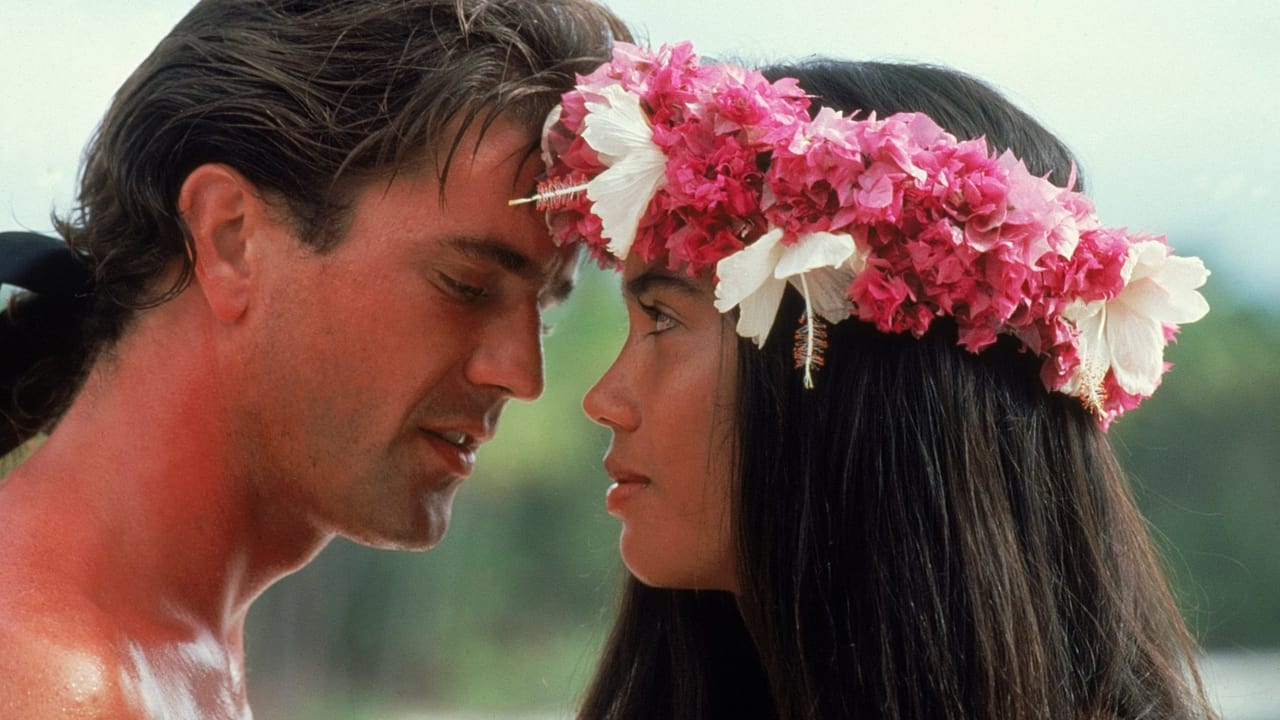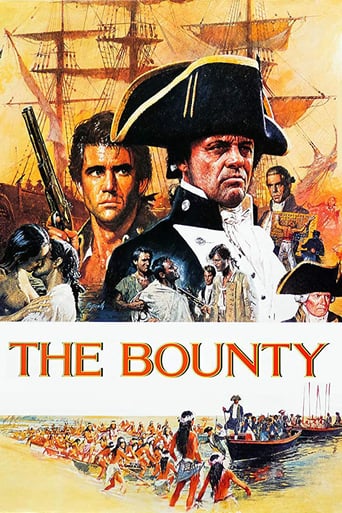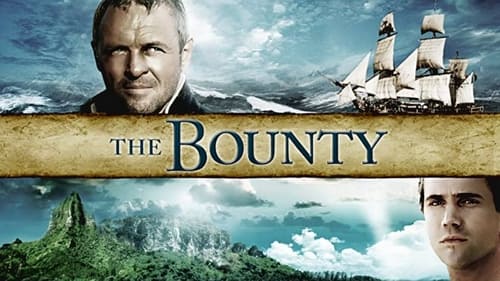



A very feeble attempt at affirmatie action
This is one of the few movies I've ever seen where the whole audience broke into spontaneous, loud applause a third of the way in.
View MoreExactly the movie you think it is, but not the movie you want it to be.
View MoreActress is magnificent and exudes a hypnotic screen presence in this affecting drama.
View MoreHe Bounty is a very good film that shows the plight of the mutineers of the HMS Bounty against Captain William Bligh. The film is filled with faces- Anthony Hopkins plays the Captain, a dashingly young Mel Gibson is Fletcher Christian- key conspirator and other faces such as a young Daniel Day Lewis and Liam Neeson as well as Laurence Olivier. The cinematography is stunning, and Roger Donaldson deftly directs such actors, not to mention shooting the ship sequences- strange that he never really became a household name. Go watch the Bounty to relive a great book.
View MoreRoger Donaldson's "Bounty" opens with the most sensational news: legendary rivals Captain William Blight and Master's Mate Fletcher Christian knew each other very well, in fact, they were close friends and it was Bligh's personal insistence to have Fletcher aboard the Bounty for their commercial mission to Tahiti. This is the third most famous retelling of the iconic mutiny, and right from the start, the tone is set. And the film shakes up all the preconceived notions we inherited from the two predecessors, regarding the personalities of both Christian and Bligh, assuming (rightfully) that we're familiar with them. And like no viewing of "The Bounty" will get away without inspiring many déjà vu reactions, no review of "The Bounty" can ignore the 1935 Best Picture winner and the 1962 Best Picture nominee.The first one featured Charles Laughton as a tyrannical master in command and Clark Gable a romantic figure and the second had Trevor Howard as a more three-dimensional but no less cruel Captain while Marlon Brando played a more enigmatic Christian, with the weirdest manners. The two films were far from being historically accurate but put together, they covered the principal aspects of the Bounty journey. Even the 1935 film with the most villainous Bligh, allowed the viewers to appreciate his heroic exploit of leading the 18 loyalists to the Island of Timor, stranding for almost two months over the Ocean with provisions for one week. And the 1962 Christian wasn't the dashing flamboyant hero portrayed by Gable. The 1984 goes even further in the depiction of Bligh as a rather misunderstood but well-meaning chief and Christian as a man who might be his own enemy.It all comes down to Bligh being the lead of the story, played by a young-looking Anthony Hopkins, telling the story in flashback while being interrogated by a court composed of Edward Fox and Laurence Olivier. There are a few reaction shots on Hopkins where I suspected it was his genuine admiration for his mentor, and the sadness to see him weakened by age and sickness. The idea of Bligh being the lead contributes to the most essential mission Donaldson and screenwriter Robert Bolt assigned themselves, terminating mystification of the infamous mutiny.The script, based on Richard Hough's book, is reliant on facts rather than artistic licenses. It's a case of cinematic maturity where no emotions are overplayed, with no comical reliefs, no outbursts of anger and no romantic speeches. The film is served by a real British dream-cast including Daniel Day-Lewis and Liam Neeson but the second pillar is of course, the then-rising star Mel Gibson. He doesn't speak a lot in the film, which draws an aura of constant interrogations we know nothing about them, except that they seem to have found an answer in Tahiti. Gibson's Christian (what a prophetic role) is a man in total opposition with Bligh, despite their friendship. During their first exchange, he maliciously comments on the breadfruit mission as simple grocery job, Bligh didn't pick out the sarcasm; he saw the accomplishment beneath the work, being the successor of Cook, making a trip around the world. Bligh is a man of duty yet with dreams of prestige and he intends everybody to share his enthusiasm and passion, Christian is a man of passion who found in Tahiti's idle and simple life, the roots of his personal vision of happiness. Their antagonism finally sparkles during the mutiny; Christian can't stand the reasonable obsession of his Master, his capability to repress his feelings. Mel Gibson's acting during that pivotal moment looks almost like an internal mutiny within the mutiny. Although Gibson is as handsome and passionate as Gable and Brando; "The Bounty" efficiently deconstructs his image, while recognizing the naval genius of Bligh. There wasn't much controversy in this Bligh, but as I pointed out in the previous films' reviews, the mutiny was justifiable without the tyranny, after all, Bligh had his loyal men and the mutiny wasn't the most unanimous operation. "Bounty" adopts the theory that the sailors were so used to the idle lifestyle of Tahiti that they couldn't accept another trip, especially since Bligh wanted to round the Cape Horn again, a nightmare for ships. The mutiny was bound to happen. This is the angle Donaldson chose.And as right as he was, as subtle and realistic and accurate as "The Bounty" was, it flopped at the box-office. Despite its critical acclaim, the score from Vangelis was ignored, and the film didn't get any nominations. The film doesn't even have the same reputation than the 1935 and 1962, which seems to highlight the limits of an excess in realism. Is it possible that the story was too famous people didn't want to see another 'Bounty' mutiny, is it possible that people wanted a colorful villain and not a character study. Something was obviously missing that didn't allow the film to take off. But speaking for myself, I enjoyed it a lot, it is a terrific complement to the other two, and a necessary one to have a more global and objective vision of the facts. Sure, some parts are reminiscent of the previous films, like the Cape Horn storm or the arrival in Tahiti, but the performance of Hopkins could carry the film even if it lasted for four hours, and the part with the longboat alone could have made a terrific story.I said the film assumed that we saw the first two, this is why it could have worked better had it focused on the parts that weren't well covered by them, if it dealt with the Pitcairn expedition like it did with the trip to Timor, or the portrayal of Tahitians (more subtle than their depiction as all-smiling garland-carrying natives). Maybe "The Bounty" had more to show than it actually did, but at least, it gave Bligh the break he deserved since half a century.
View MoreThis version of "The Bounty" story was one of David Lean's unrealized projects. The screenplay was by Lean's longtime collaborator Robert Bolt and it finally reached the screen under the direction of Roger Donaldson who actually does a very good job. This takes a different slant on the usual take on the mutiny making Bligh, (an excellent Anthony Hopkins), if not exactly the hero, considerably less of a villain than he is usually painted while Christian, (Mel Gibson), is weak and dissolute with his own, selfish motives for rebelling. There is also a much greater emphasis on the events after the mutiny than in previous pictures.It may lack the physical excitement of the Frank Lloyd version but it's definitely an improvement on the elephantine Brando/Howard remake. The large cast includes early performances from Daniel Day-Lewis and Liam Neeson as well as Edward Fox and Laurence Olivier as officers presiding at Bligh's court-martial and there's a terrific performance from the New Zealand actor Wi Kuki Kaa as King Tynah. Like all good yarns this has stood the test of time remarkably well.
View MoreWell, on paper it seemed like a mutiny was all but a given, wasn't it? Stick a group of dishevelled, starved, barely experienced sailors on a boat for months on end with no female contact and then introduce them to basically paradise, and they are not going to want to leave any- time soon. The first error of The Bounty is that it goes to little lengths to actually visualise this agonising duration on a dirty boat. It doesn't feel like they have been shackled to one area for a long period of time. Everything is forwarded to us via characterisation - every beating, lashing, gagging. We spend little time on that dinghy that Bligh and his loyalists are cast off on, and what is supposed to be a courageous and harrowing journey back to civilisation happens in a few blinks of the eye, a few dissolves to show time. It's also been praised for a more moderate representation of Bligh, not as a monster, but as a measured, intelligent captain that was overcome by unfortunate situations. I do not see it. Hopkins is a fine actor, but his Bligh is seemingly written as a complete and utter dictator of HMS Bounty, punishing every small indiscretion severely, refusing to acknowledge his men's perspectives, full of blustering pride for himself and disdain for even his commanding officers, and finally completely blinded by any adverse effects his decisions may result in. A final confrontation before the mutiny itself between Hopkins and Gibson is riveting; Fletcher offers him a final out, a chance to renounce his totalitarian rule, and Bligh responds with seething disapproval, Hopkins shivering with sweat and a delirious rage. Well it would be riveting, but this is not an explosion of anger for Bligh's character, merely the predictable end for such a despicably written captain. It would be much more affecting had the movie not already set its sights on that sudden redemption once he has been cast off the Bounty, and naming him a hero at the movie's end. Vangelis has done many an iconic score, but this must count as one of his most overbearing. It doesn't wait for an appropriate moment to chime in, but merely powers its way through ever scene with a feigned dramatic importance. In the early sequences where the sunlight blasts, the wind rips through the sails and the promise of the sea is a fresh adventure the score is dreamy and inviting, using these harp glissandos to earmark the moments of bliss like dropping anchor for the first time in weeks. And then it turns foreboding and unrelenting; a relatively unsubtle bit of symbolism is the heavily percussive track which plays as Fletcher first chases and kisses his native bride-to-be, and the banging of the drum is almost like a loud, ominous cannonball shot. And then it will match each furious glare from Hopkins at his crew's insubordination - piercing as he looks upon the couple becoming more intimate, pulsing with anger as the deserters are lashed, high- pitched as he repeatedly orders the ship to be cleaned spotless. It does no favours for Bligh's characterisation - after a while you feel like mutiny yourself, because the soundtrack has made it like Hopkins is right next to us, bellowing into our ears himself. It also makes the silly mistake of using a flashback structure so that the entire series of events are narrated from a future court adjudicating on Bligh's actions. A better movie could make this work, but here it just serves to telegraph every little detail of the plot and remove all tension created. We know that Bligh and his loyalist ultimately make it back, so it becomes less a case study for him and more one of Gibson and the dilemma he faces with his mutiny. When Hopkins' weary voice-over chimes in and thinks back on how he thought it was just youthful passion that made his master's mate abandon his duties, it not only immediately signals what is to come, but it significantly weakens his own insight as well. Add to that the paradoxically suffocating soundtrack that drowns out any actual acting and it becomes near insufferable.
View More